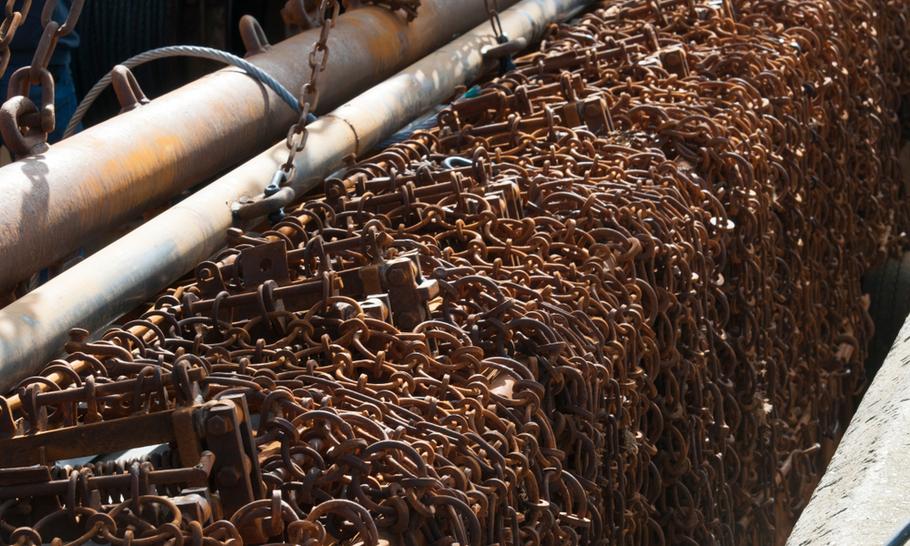If Brexit means anything, it should put a stop to bottom trawling in UK waters

Chains to trawl sea bed (Shutterstock)
If you buy fish in Britain, the chances are that it will come with a label claiming that it has been “responsibly sourced” or that the methods are “sustainable”. Yet these sources and methods include bottom trawling. And the fish on your table may also come from the UK’s marine protected areas (MPAs). In all but one of these 76 areas, which cover 40 per cent of England’s offshore waters, it is at present legal to drag heavy equipment across the seabed, destroying habitats for marine life and preventing fish stocks from recovering. In other words: these protection areas are not protecting anything.
An analysis by the Marine Conservation Society (MCS) makes for shocking reading. Using satellite tracking data between 2015 and 2018, the MCS found that both British and EU trawlers were taking full advantage of their right to deploy this drastic and destructive form of fishing, which also releases huge quantities of carbon. UK boats were responsible for 43 per cent of bottom trawling in MPAs and EU vessels for the remaining 57 per cent. The Society was scathing about this wholesale exploitation, which it said was “equivalent to bulldozing a national park on land”. In response, the National Federation of Fishermen’s Organisations said: “There is no outright ban on farming in our national parks,” adding that coastal communities were dependent on MPAs for their livelihoods. But bottom trawling is not farming and it is certainly not sustainable. Fishermen, like farmers, need incentives to move from maximising production to preserving the maritime environment.
The Brexit negotiations on fishing rights do not seem to have given due weight to the problem of sustainability. But it is now incumbent on the British Government to take a tough line, both with domestic and foreign trawlers. It is disgraceful that the EU has permitted such degradation of the seabed over many decades, but that is no excuse for the UK to allow it to continue.
The new Fisheries Act is a vital opportunity to rectify this reckless annihilation of one of our most precious resources. All bottom trawling should be banned immediately in MPAs and over a short period it should be phased out elsewhere in British waters. A generous scheme to help coastal communities adapt should be part of the package. The Scottish Government and the Parliament at Holyrood are also key players, as the highest fishing rates of all are in the North Sea off the Scottish coast — and by British boats.
Negotiations should also begin with the six EU countries that are significant bottom trawlers in UK waters: Belgium, Denmark, France, Germany, Ireland and The Netherlands. The case for preserving fish stocks, protecting delicate organisms such as coral reefs and preventing carbon release is so overwhelming, so unarguable, that these nations — and the EU Commission too — would have to concede it. Even if they do not, the decision is ultimately ours now. With sovereignty comes responsibility.
The dire consequences of such industrial scavenging — to call it fishing is an insult to responsible fishermen — are evident across the seas and oceans of the world. Chinese fleets in particular have a reputation for extracting everything that moves as they traverse international waters. The practice of bottom trawling is no less heinous than whaling or big game hunting. Yet it has not so far attracted the same attention from the wildlife-loving public. That must change — and so, perhaps, must our eating habits. Would a ban on bottom trawling make fish slightly more expensive? Probably. But so, too, would fishing the oceans to extinction. That is where ruining the ocean floor will ultimately lead. As things stand, marine biologists estimate that a cessation of bottom trawling would enable our seabeds to recover within five years. That measure alone is not enough, but a careful policy of marine conservation — in which coastal communities should be key players — will eventually allow sea life to flourish again in our ravaged waters. The UK could become a global pioneer of sustainability at sea. Just as the British set an example to the world in the prevention of cruelty to animals, so we can do the same in enabling our offshore waters to recover and flourish. To do so is not only a duty: if fish are to survive on this earth, it is a necessity.
A Message from TheArticle
We are the only publication that’s committed to covering every angle. We have an important contribution to make, one that’s needed now more than ever, and we need your help to continue publishing throughout the pandemic. So please, make a donation.





